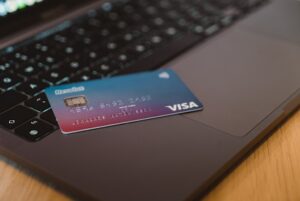A virtual credit card is a number generated by a credit card company, that is not tied to a physical credit card. A credit card company or bank issues virtual credit cards. They are available for online transactions, such as making purchases on eCommerce websites. Users can pay bills through these cards on online apps and websites.
As there is no physical card, a virtual credit card is safe. There is no risk of card skimming or duplication. A user can’t do physical swiping of a virtual credit card. This makes it a good option for security-concerned individuals. It helps to protect personal financial information.
Features of a virtual credit card
They do not have a physical card like a normal bank credit card. They have everything like a normal credit card like CVV, valid through date and name. Major companies such as Visa, MasterCard, or American Express issue virtual credit cards.

Virtual Credit Cards are good for increasing the security posture of a user. They are useful if you shop online or if you are using any apps which do not appear to be of top-notch security. A lot of services also ask for credit card details to verify a user’s identity through a credit card. In place, of providing their original credit card details a user can opt to use a virtual credit card. Further, this can help to mask real credit card details.
Identity protection in Virtual Credit Cards
A virtual credit card can help protect your identity. They provide an additional layer of security for your personal financial information. Since a virtual credit card is not tied to a physical credit card, it cannot be stolen or used in a physical transaction. It is difficult for a potential thief to use your credit card information to make unauthorized purchases or access your accounts. Virtual credit cards do not offer too many rewards. If you are looking for a rewards credit card, do look for our guide.
Security features in virtual credit cards
Many virtual credit cards offer security features that can help protect a user’s identity. These include the ability to generate a new virtual credit card number for each transaction. This means that even if a thief is able to access your information, they will not be able to use it since the number will no longer be valid. Using a virtual credit card can help reduce the risk of stolen identity. While it’s not a foolproof solution, it can provide an extra layer of protection for your personal financial information.
What are the advantages of using Virtual Credit Cards?
These cards are good for certain use cases wherein a user doesn’t want to divulge their credit information. Some of the use cases of virtual trade cards are as follows:
Fraud protection in virtual credit cards
If you do not trust a particular website or if it looks a bit sketchy it’s good to not use your real credit card. Apply for a virtual credit card and use it to process any payment transaction on these websites. As your credit card details are not exposed online you can save yourself from any fraudulent use.
Recurring payments
A lot of websites offer recurring monthly payment options. You may end up paying for services whether you use them or not. A $10 service may appear to be a bargain but if you add up too many subscriptions this may be a drag on your budget. Subscription services are easy to set up. But when the user wants to cancel the subscription, the process may be through hoops. A user may have to call up a number and wait to speak to an agent to go through the cancellation request. Virtual Credit cards can be a savior here. If you are not sure that you want to use the service for a long time, it is a good idea to use a virtual credit card. You can block any future transactions or use the service for a month and forget about any repayment.

Identity Theft
Impersonators and bad actors set up websites to collect the credit history of novice users. These bad actors may use the credit card details and other personal details available to impersonate a person on social media. They may also get a complete credit history of the person from the credit bureaus. These bad actors can further misuse credit information to take a loan or mortgage in the name of the victim. To prevent yourself from this agony, we recommend using a virtual credit card as much as possible in your web use.
Data leakage
With the advent of the cloud, all our financial information is now available online on cloud servers. More and more companies put their data in the cloud. This data is only as secure as the company that is securing it. Hackers target less secure websites, and apps. They gain access to user details, stored credit cards, and other personal data. They sell this financial information over the dark web to other hackers or bad actors. For the safety of your own data, it is advisable to opt for virtual credit cards for less secure websites. Even popular websites have fallen to data leakage in the past from hackers.
Are Virtual Credit Cards Safe?
In conclusion, any financial instrument is only as safe as the safety habit put in place by a user of the service or product. Virtual Credit cards provide another layer of safety that the product offers limited downside.
Of course, it’s important to keep in mind that no method of payment is completely foolproof. It’s always a good idea to take steps to protect your personal financial information. Always use strong, unique passwords for your online accounts. Avoid sharing your credit card information. Finally, make it a habit to check your credit card statements for unauthorized charges.
What is the downside of using Virtual Credit Cards?
There are a few potential disadvantages to using a virtual credit card. One potential disadvantage is that not all merchants accept virtual credit cards. A user may not be able to use her virtual credit card to make purchases at certain stores or websites.
Some virtual credit cards may have fees associated with their use. For example, this could be a monthly or per-transaction fee. Virtual credit cards do not provide fraud protection as physical credit cards. In case of abuse, a user has to block their cards themselves.
While they do offer an added layer of security as compared to physical cards. There is still a risk that a thief could gain access to your virtual credit card number. Bad actors can use it to make unauthorized purchases.
While virtual credit cards are a useful tool, they are not without potential drawbacks. It’s always important to weigh the pros and cons before deciding if a virtual credit card is right for you. In the end, apply for a virtual credit card unless you have good use of a virtual credit card.
Where can I get a Virtual Credit Card?
Usually, banks, Credit Card issuers, and FinTechs offer Virtual Credit cards. To apply for a virtual credit card reach out to an issuer. Though, each company will have its own process for applying for the card. But in general, you can expect to fill out an online application. In the online world, if a Bank is asking to come to a branch for a virtual credit card, it should be a hard pass.
After submitting the application, the company will review it. They will determine if you are eligible for a virtual credit card. If they approved a user’s application they will generate a virtual credit card number. They will also provide the user with instructions on how to use it.
Customers can access their virtual credit cards through the company’s mobile app. Some virtual credit cards may have fees associated with their use. Finally, always read the fine print before applying for all financial products. So that tomorrow you are not surprised by the charges.
